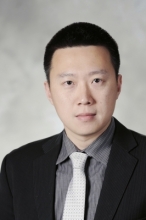EECS Seminar: Building Heterogeneous Integrated Systems for Future Wireless Communication and Sensing

Associate Professor
School of Electrical and Computer Engineering
Georgia Institute of Technology
Abstract: Silicon-based integrated electronics have become one of the most powerful human-made platforms for building complex systems that can detect, generate, process and store information at an unprecedented level. Future innovations in integrated electronics rely on exploiting heterogeneity at both the technology and system level. Recent rapidly growing applications of 5G wireless, IoT and bioelectronics are perfect examples with their cross-domain combination of communication, sensing and computation. In this talk, I will introduce several research project examples at Georgia-Tech Electronics and Micro-Systems (GEMS) lab that achieve technology innovations by exploring such heterogeneity.
First, I will present several mm-Wave circuits and systems for 5G massive MIMO communication and radar by fusing complex electronics with radiators and signal processing. In particular, novel multifeed antennas and their co-integration with electronics can actively synthesize desired radiation responses with unprecedented on-antenna functionalities and reconfigurability far beyond electronics-only designs, including high-efficiency power combining, impedance scaling, noise cancellation, polarization full-duplex communication and THz signal radiation.
Next, I will delve deeper into the design of mm-Wave power amplifiers and transmitter systems that govern both energy efficiency and spectral efficiency in many wireless communication systems. I will present several recent designs from my group that overcome silicon device limitations by leveraging architecture/circuit innovations, electromagnetic structures and signal processing techniques. Finally, as a new research path toward future intelligent wireless front ends for ultra-low latency and physically secured networks, I will present our new mm-Wave MIMO front-end architectures that can autonomously track desired signals or spatially filter out unwanted interferences without back-end DPS-based beamforming computations. I will also introduce our early work on using artificial intelligence to enable rapid in-field reconfiguration of complex mm-Wave front ends as well as direct synthesis of on-chip electromagnetic structures for future design automation of mm-Wave/THz circuits.
Bio: Hua Wang is an associate professor at the School of Electrical and Computer Engineering at Georgia Institute of Technology and the director of the Georgia Tech Electronics and Micro-System (GEMS) lab. Prior to that, he worked at Intel Corporation and Skyworks Solutions on mm-Wave integrated circuits and RF front-end modules. Wang received his master's degree and doctorate in electrical engineering from the California Institute of Technology, Pasadena, in 2007 and 2009, respectively.
Wang is interested in innovating RF, mm-Wave and THz integrated circuits and hybrid systems for wireless communication, radar and sensing applications.
Wang received the DARPA Director’s Fellowship in 2020, Qualcomm Faculty award in 2020, DARPA Young Faculty Award in 2018, National Science Foundation CAREER Award in 2015, the IEEE MTT-S Outstanding Young Engineer Award in 2017, the Georgia Tech Sigma Xi Young Faculty Award in 2016, the Georgia Tech ECE Outstanding Junior Faculty Member Award in 2015, and the Lockheed Dean’s Excellence in Teaching Award in 2015. Wang served as a Distinguished Lecturer for the IEEE Solid-State Circuit Society (SSCS) 2018-2019 and as guest editor of the IEEE Journal of Solid-State Circuits for special issues of multiple SSCS conferences. He is a Technical Program Committee member for IEEE ISSCC, RFIC, CICC and BCICTS conferences. He is also chair of the Atlanta’s IEEE CAS/SSCS joint chapter that won the IEEE SSCS Outstanding Chapter Award in 2014.
Host: Hamidreza Aghasi
Share
Upcoming Events
-
MAE 298 SEMINAR: Co-Designing Mutual Aid Transportation for Disaster Resilience
-
CBE 298 Seminar: Engineering Strategies for Structural Heart Disease
-
MSE 298 Seminar: Radiation Resistance and Mechanical Response of Ceramics in Extreme Environments
-
MAE 298 SEMINAR: Stretchable Electronics for Soft Biological and Robotic Systems
-
CBE Distinguished Lecture/CBE 298 Seminar: Computational Design of Peptides as Detectors, Sensors and Drugs
